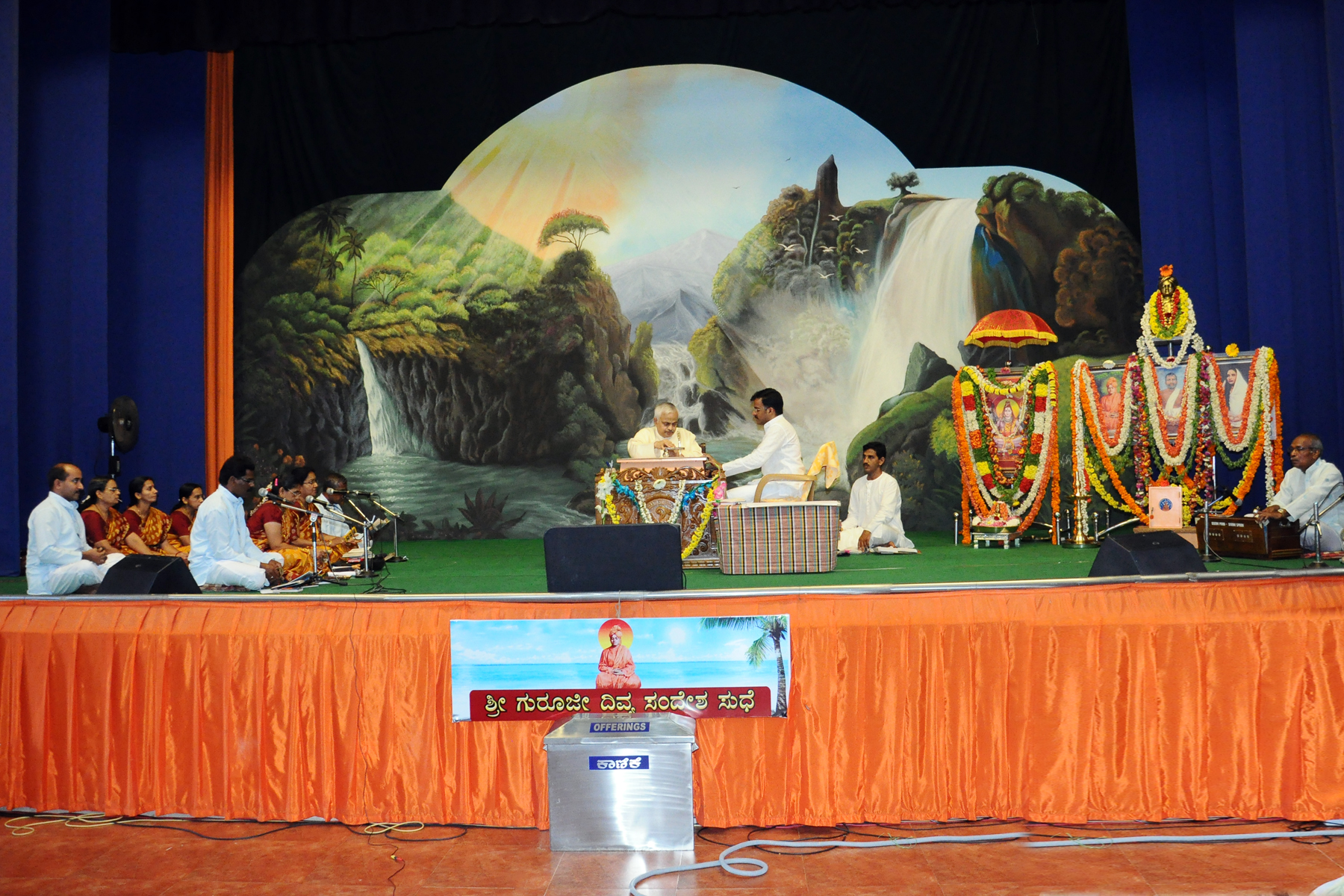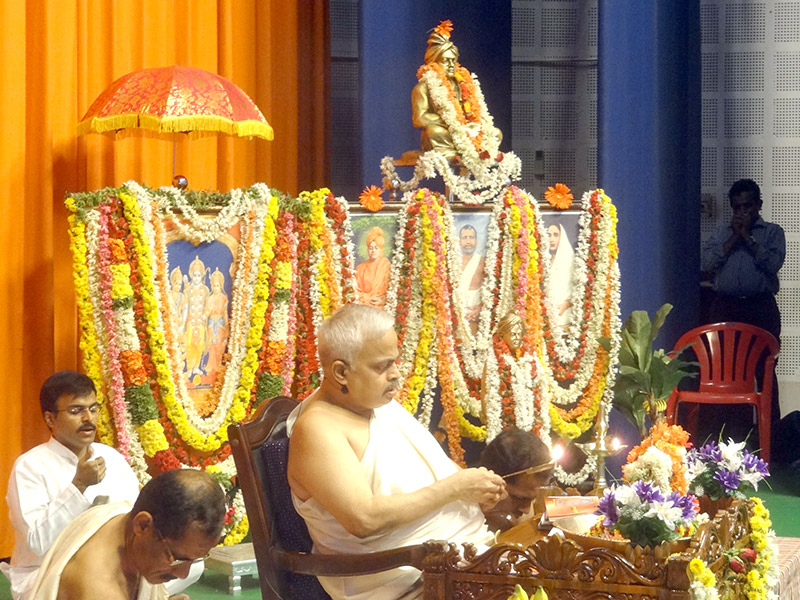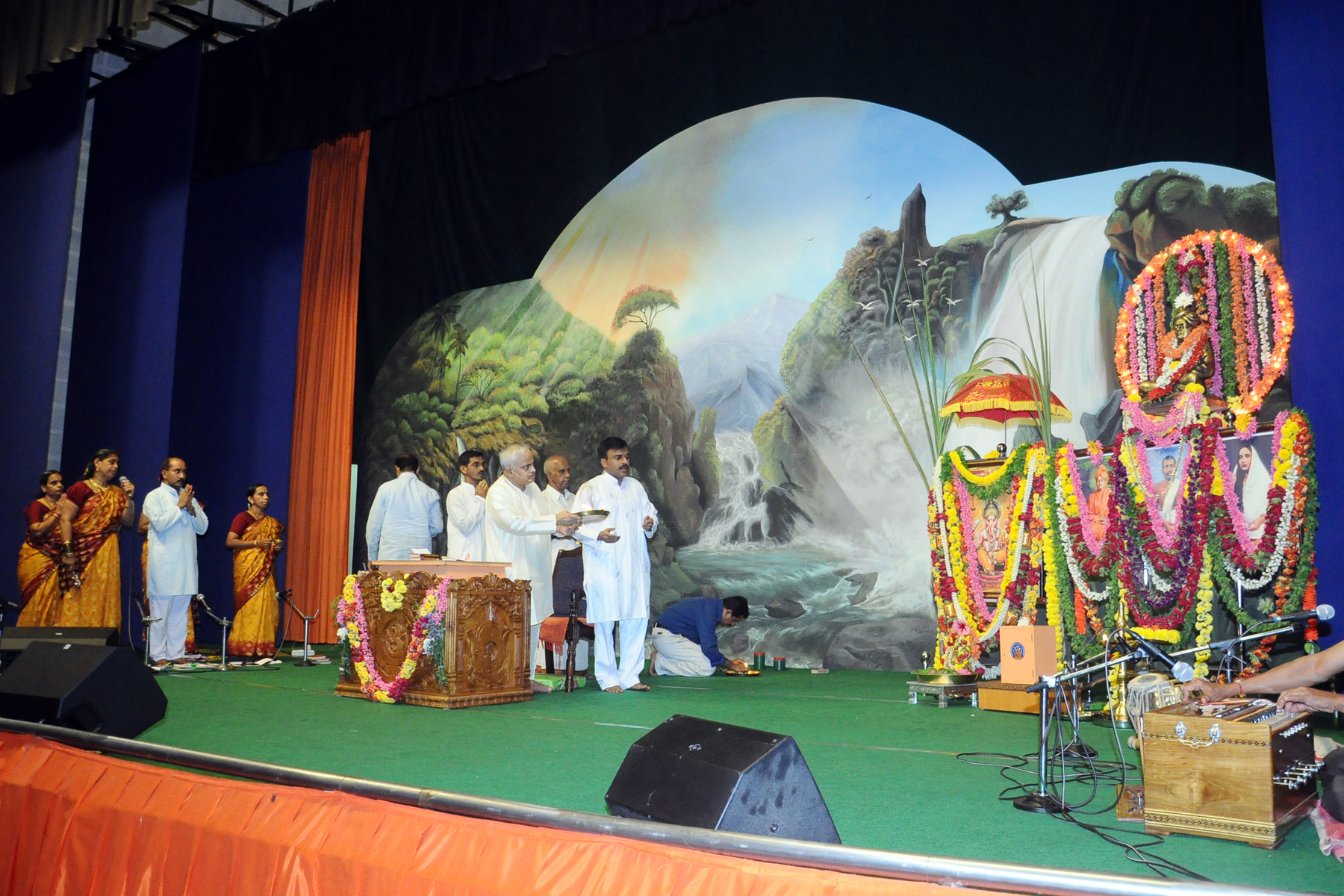Divine Festivals

Shiva Rathri
Lord Shiva tests the selflessness– the virtue which makes the devotee to give others with no expectation in return. According to the English calendar this happens to be the first festival in the newyear. Nil-selfishness is the expression of love through service and sacrifice. Sharing what one owns for the welfare of all is possible only when there is love and compassion towards all – the feeling that all are our own, children of the same Lord. Sri Guruji explains that the bhasma (sacred ash) worn by Lord Shiva implies the impermanence of the physical assets– hence it inspires one to come out of selfishness.
On the nearest Sunday of MahaShivaratri at the temple of Divine Park special kumkumarchana is offered to the Lord Shiva in the morning. Offering of bilwa leaves and flowers with mass recitation of Shiva AshtottaraShataNamavali, Shiva Sahasranama, Bhajans – form the part of celebrations done in the morning. Sri Guruji nicely explains the importance of selflessness and also the various spiritual Sadhanas through which one can realize Lord Shiva as such in the afternoon.

Sri Rama Navami
Lord Sri Rama is the personification of the Pure Love. Love is the first Divine virtue which has the power to vanish most of the problems that we are facing. Sri Rama is premaswaroopa. Innumerable are the instances in his life which inspire us to develop Love towards all. He expressed blessedness towards all around him: his parents, brothers, wife, the jealous step-mother – Kaikeyi, the boatman Guha, the cursed Ahalya, the unknown Shabari, the birds Jatayu and Sampati, the monkey chiefs like Hanuman, Sugreeva and others, the demon Vibheeshana (Ravana’s youngest brother) – the list goes on – innumerable were those who drank the nectarine love of Sri Rama! At the battlefield when Ravana was completely deprived of his army and weapons – Sri Rama sends him back unharmed stressing that he only wanted to take back Sita. There was no element of enmity or anger in Sri Rama. The egoistic Ravana was not in a position to understand the greatness of such Love – and thus got punished. Again, it was the Love of Sri Rama
which made the whole country of Ayodhya wait very earnestly for the return of Sri Rama from the 14-year-exile.
The auspicious shuklanavami of chaitramaasa heralds the descent of the Lord Sri Rama upon the earth. On this day our prayers would be the best when it is for the good of all.
This happens to be the first festival according to the Indian calendar. At the Divine Park, special archana is performed to Lord Sri Rama in the morning. The Special planchette session by Sri Guruji in the afternoon details upon the importance of Love and the glory of Lord Sri Rama. The various observances like fasting, distribution of fruit juice were all devised with deep spiritual meaning – which Sri Guruji explains appropriately to fit the current times. All these years, thousands of devotees have been blessed and inspired in various ways to progress in Sadhana on the occasion of Sri Rama Navami. The session is followed by aarati and distribution of sacred prasadam.

Sri Krishna Janmashstami
Lord Sri Krishna epitomizes the Divine virtue – Dutifulness. Spiritual Sadhakas all over the world have been benefited immensely by the most sacred Srimad Bhagavad Gita – which is Lord Sri Krishna’s message to uplift the humanity. Throughout the Gita the Lord stressed the utmost important duty to be done, with no attachments to the fruits thereof. Sri Krishna himself performed various ‘duties’ even though he didn’t have an obligation towards the same – in this way he wanted to lead all by a personal example. Lord Sri Krishna blesses all those who perform their own duties with utmost dedication as true worship as such.
Innocence and simplicity are the two virtues which are most dear to Lord Sri Krishna. Sudhama, Vidura, Akrura, the Gopis of Vrindavan – were all filled with these qualities and the Lord readily accepted their prayers. Sri Guruji has been explaining the spiritual significance of the various observances followed by devotees on this day.
The offering of butter, avalakki (beaten rice), and various dishes, the breaking of ‘mosaru-kudike’ (pot with curds), were all made part of our culture in order to blossom divine virtues of simplicity, innocence, dutifulness and loving devotion to the Lord. At the temple of Divine Park special pooja is offered to Lord Sri Krishna in the morning. Later the same afternoon. Sri Guruji vividly describes the spiritual importance of all these rituals – thousands of devotees are cherished from the same year on year.

Sri Ganesha Chaturthi
Lord Sri Ganesha stands for the Divine Virtue – Patience. Patience is that Divine nature which enables us to maintain the inner calmness amidst external chaos. Calmness of mind is the most ideal quality that we observe in great spiritual Sadhakas all over the world. In today’s world of tensions and rush we usually do not perform our duties in family, society, studies etc. Our behavior with others is also becoming harsher for no good reason. The sudden spurt of psycho-somatic diseases like hypertension, back pain, lack of quality sleep insomnia – are all due to our own failure in developing patience. Thus patience is a must to improve our health as well as our involvement in any other activity.
Sri Guruji says that by submitting oneself to Lord Sri Ganesha one can easily develop patience and forbearance. Lord Ganesha also blesses us in developing sharpness and agility – as a result of which, we perform much better in our studies and other physical activities. Lord Sri Ganesha is referred to as Siddhi Vinayaka, Vighnaharta, BuddhiPradaayaka and so on. The various observances followed on this occasion are intended to inculcate patience and forbearance in us, and also offer our own lot of karmic load to Lord Sri Ganesha. At Divine Park temple, special pooja is performed in the morning. Offering of flowers and garike-grass, with mass recitation of GaneshaSahasranamavali, GaneshaAshtottaraShatanamavali, and Bhajans are done. Starting from 2.30 PM Sri Guruji also elaborates the importance of patience and tolerance during the special planchette session.

Navarathri
The Divine Mother stands for the Godly virtue – Forgiveness. We all know the adage – ‘to err is human, to forgive is Divine’. Forgiving – which means to disregard and forget the wrongs done to us – is the most difficult of the five Divine virtues. The memory of the wrongs done by others is usually so strong that they trigger the feelings of anger, hatred and revenge as soon as we remember the person. We need to beseech the Divine Mother to inculcate in us this great virtue of forgiveness. The nine days of celebrations also represent the fight between us and the ‘inner nine foes of sedation’ viz., lust, anger, greed, passion, pride, jealousy, egoism, egotism and suspicion. Sri Guruji has eloquently described how a devotee needs to submit to the Divine Mother on all these nine days. When the devotee succeeds in offering all the inner dirt at the feet of the Mother, then the tenth day – VijayaDashami – heralds the true victory of the Divine over the evil forces. All these days we need to pray the Divine Mother – called by various names like Lalita, Durga, Kali, Saraswati, Lakshmi and so on – for forgiveness for all our mistakes done knowingly or unknowingly. Likewise, we also need to develop forgiveness within.
At Divine Park temple, Jaganmata is offered special pooja on the Sunday morning in Navaratri. Afternoon after Bhajans Sri Guruji also elaborates the ill-effects of the ‘nine foes’ and the various spiritual practices through which one can offer them to the Divine Mother. Sri Guruji has often repeated that among the five Divine virtues forgiveness alone accounts for 50% to attract God’s grace. Forgiveness not only gets us the bumper grace of the Lord, but also transforms the person from animality to divinity.

